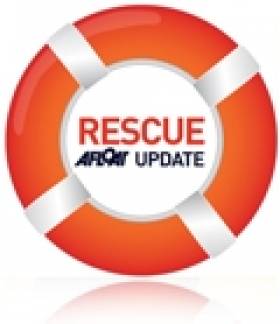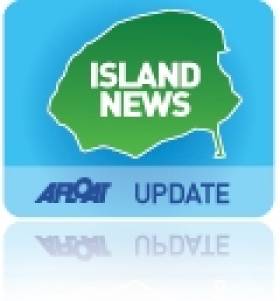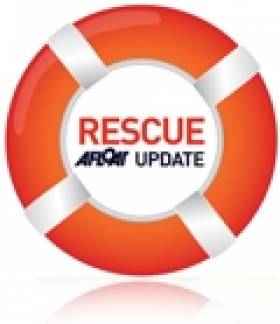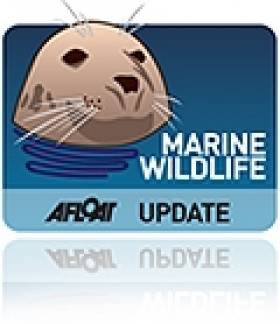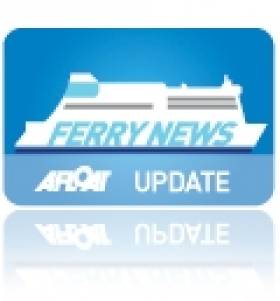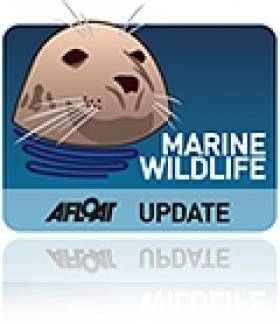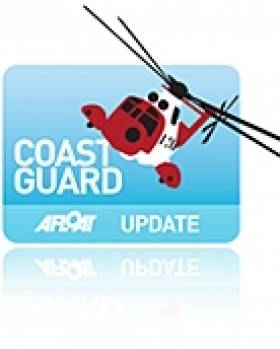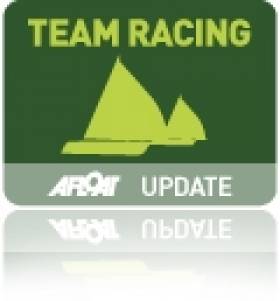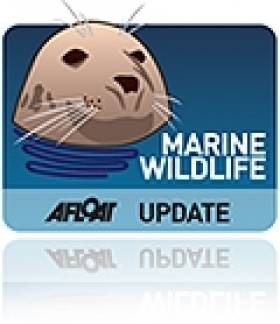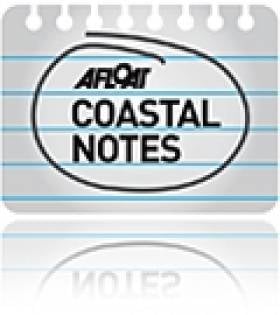Displaying items by tag: west cork
Search Resumes for Missing Fishermen in West Cork
#RESCUE - The search resumed this morning for five men missing after their fishing boat went down in rough seas in West Cork early yesterday, The Irish Times reports.
One of the six-person crew of the Tit Bonhomme was rescued when he was able to reach the shore, after the boat ran aground near Adam's Rock at the mouth of Glandore Harbour.
The missing include skipper Michael Hayes from Helvic Head in Co Waterford, Dubliner Kevin Kershaw (21) and Egyptians Said Mohammed (23), Wael Mohammed (35) and Attea Ahmed Shaban (26).
Abdul Mohammed (43) was airlifted by Irish Coast Guard helicopter to Cork University Hospital, where he is in a stable condition.
As previously reported on Afloat.ie, the fishing boat was returning to its home port of Union Hall early on Sunday in strong force 7-8 southeasterly winds when the incident occurred.
Naval Service and Garda divers were scheduled to search the sunken vessel today after postponing yesterday due to poor light and big swells.
The Irish Times has more on the story HERE.
New 2012 Timetable for Cape Clear Ferry
#ISLANDS -The Cape Clear Ferry which operates the service between the Wst Cork island and Baltimore, has outlined revisions to sailing schedules for this year. The proposed changes follow a consultation process held with the islanders, as previously reported on Afloat.ie
The changes to sailings during the months of May, June and September and also to schedules between 1st April-30th December are available to view by clicking HERE.
In addition a table showing the minimum frequency of daily return sailings are also outlined.
Air Corps Patrol Assists in Rescue of Injured Fisherman
#RESCUE - The Irish Times reports that an Air Corps maritime patrol aircraft joined a search and rescue mission to evacuate a fisherman off the West Cork coast today.
The Casa CN 235 - one of two operated by the Air Corps - diverted from its daily patrol to provide a communications relay in the operation to rescue an injured crewman from a Spanish fishing boat some 100 miles south of of Castletownbere.
The fisherman was airlifted by an Irish Coast Guard helicopter which at last report was taking him to medical attention in Cork.
Waterford 'Best Place to Be' for Fin Whale Sightings
#MARINE WILDLIFE - Last Tuesday heralded an incredible eight whale sighting reports off the Waterford coast, according to the Irish Whale and Dolphin Group (IWDG).
Sightings co-ordinator Pádraig Whooley writes that most of the sightings have been confirmed to be fin whales, spotted close to the shore along a 20-mile stretch from Stradbally to Brownstone Head.
"For anyone interested in viewing the planet's second largest animal, clearly Co Waterford is still the place to be," he says.
But West Cork is also a hotspot for whale sightings, as BBC Autumnwatch's recent filming in the area with the IWDG illustrates.
It's expected that the large whale season will extend into February next year.
The IWDG has more on the story HERE.
Restructured Fastnet Line Reduce Year Round Service to Seasonal Schedule
The discontinued winter sailing schedule for this year is also expected not to be repeated during October 2012-March 2013. Fastnet Line's decision to make the Celtic Sea route into a shoulder season and summer only service follows a similar path taken by Stena Line which withdrew Dun Laoghaire-Holyhead (HSS) sailings in mid-September, for report click here. The central corridor route is due to reopen sometime in April or May 2012.
Cork City and County council and Kerry County council have provided €700,000 to support Fastnet Line and yesterday they announced an additional €150,000 in co-funding for the period of the examinership. In order to stabilise finances the ferry company are to radically reduce passenger capacity of the Julia (see photo) from 1,500 down to 950. This is in line with the capacities of the Julia serving 'night' sailings.
She has a crew predominately from Eastern Europe and Irish and UK deck officers. The Bermuda flagged, Hamilton registered vessel is currently berthed at Ringaskiddy Ferry Terminal, Cork Harbour. At 154m she is the largest ferry to date capable of berthing in the limited confines of the swing basin in Swansea and with a draft of 5.8m in a port which is subject to a large tidal range on the Bristol Channel.
Operating costs on the 10 hour service has been severely hampered by continuing increases to world oil prices. From the year 2010 to this year, fuel costs rose by 27% and almost 50% from the original budget of 2009. The company claims that each crossing amounts to €18,560 alone in fuel costs.
Fastnet Line to date has carried 150,000 customers, of which 75% have originated from the UK market, generating on average €350 per person (€40m approx) exclusive of fare and on-board spend. This crucial market is core to the success of the company's direct 'gateway' route to scenic south-west Ireland, with Swansea connected to the M4 motorway linking midland population centres and London. The operator claims a saving of 600km driving based on a round trip compared to using rival ferries running on routes to Rosslare from Pembroke Dock and Fishguard.
Since the reinstatement of the service in March 2010, after Swansea Cork Ferries pulled the Superferry (photo) off-service in 2006, the loss to tourism generated revenue on both sides of the Celtic Sea was estimated to be £25m per annum according to the Welsh Assembly and a similar figure recorded in the Cork and Kerry region.
The company also outlines the reduction in carbon emissions saved from operating the only direct service specifically connecting the regions of Glamorgan and Munster. Some 500,000 freight miles alone were saved in the Welsh region since the service started instead of using alternative route running from Pembrokeshire ports.
- Cork Harbour
- west cork
- port of Cork
- Celtic sea
- Cork City council
- Fastnet Line
- M.V. Julia
- M4 motorway
- Kerry
- Irish High Court
- Stena Line
- Ports and Shipping News
- cork harbour news
- Ferry news
- HSS
- Welsh Assembly
- Cork County Council
- Associated British Ports
- ABP
- Ringaskiddy Ferry Terminal
- M.V. Superferry
- SwanseaCork Ferries
- SCF
- Fastnet Line Group
- Kerry County Council
- HSS Dun LaoghaireHolyhead sailings
- Glamorgan
- Munster regions
- Bristol Channel
- Bristol Channel tidal range
- Swansea Port
- Irish tourism sector
- Pembroke DockRosslare
- FishguardRosslare
Places Available on IWDG Whale Watch Weekends
The Irish Whale and Dolphin Group (IWDG) is offering a limited number of places to non-members on its two upcoming autumn/winter whale-watching weekends in Co Cork.
The weekends, based at the Celtic Ross Hotel in Rosscarbery, are geared towards sightings of larger marine wildlife – specifically fin and humpback whales, which are commonly sighted in West Cork between October and December.
Two weekends are scheduled, on 28-30 Octover and 25-27 November, and both will include presentations as well as plenty of whale-watching opportunities on land and at sea.
The IWDG has also negotiated a special weekend rate of €120 at the Celtic Ross Hotel which includes two nights' B&B, an evening meal and a packed lunch.
The weekends are being booked in succession, both limited to 12 bookings, with seven places currently remaining for the first weekend. The IWDG warns that the trips are not suited to anyone in poor health or prone to sea-sickness, and that as always whale spottings cannot be guaranteed.
Anyone interested in attending or wishing to enquire further can contact Pádraig Whooley at [email protected] or 023 8838761, or write to the IWDG, Dereen, Rossmore, Clonakilty, Co Cork.
Search for Yacht Missing Between Bermuda and Ireland
An air and sea search operation is underway for a yacht missing en route from Bermuda to Ireland, The Irish Times reports.
The Golden Eagle has been out of contact since leaving port on 21 August. It was due to arrive with its two-man crew - a 69-year-old Norwegian and a 60-year-old New Zealander - at Crookhaven in West Cork last Thursday.
The Irish Coast Guard told the Press Association said that the Naval Service and Air Corps are involved in the search off the south west coast, and ships in the mid-Atlantic have also been asked to try to contact the yacht.
The yacht is described as being 9.8m (32ft) long, white and with a blue trim on the side.
Schull Welcomes World Team Racers
The seaside village of Schull was en fete yesterday as, in bright sunshine, locals and visitors alike turned out in huge numbers to welcome sailors from around the globe to a world event based in a village setting.
Already, the Australian team , early midweek arrivals, have expressed their wonder and appreciation at the West Cork welcome afforded them, the beauty of the Mizen Peninsula and its proximity to that iconic sailing landmark–the Fastnet Rock.
They have now been joined by teams from the USA, Great Britain, Italy, Spain, Japan, Thailand and Ireland to contest the ISAF World Team Racing Championships throughout this week.
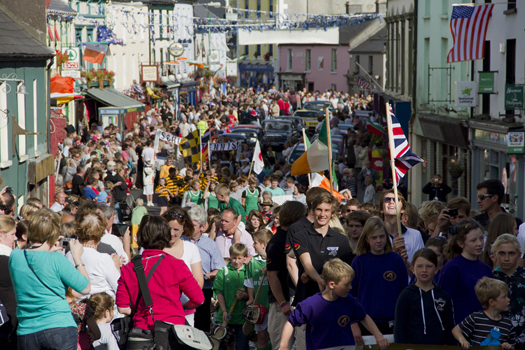
Schull village welcomes the ISAF Team Racing event yesterday. Photo: Brian Carlin. Scroll down for more photos.
The village was a riot of colour as the parade of nations made its way up the main street, with premises flying the flags of their adopted nations and their window displays imaginatively paying tribute to the visiting teams. The parade was led by ten vintage cars, with ten more bringing up the rear, and the ever popular Skibbereen Silver Band Providing the music.
The entourage reflected elements of the sporting, cultural and artistic life of the local area with groups representing Irish traditional music and dance, local youth and sports clubs and Schull Drama Club providing a particularly interactive and quirky element to the proceedings. The international teams, interspersed throughout the parade were treated to a rapturous welcoming reception from the kerbside audience which, judging by their responses, they thoroughly enjoyed.
At the reviewing stand an official welcome from the Schull community was extended by Schull And District Community Council Chairman, Sean Lannin. A charming touch was added to the occasion in the form of each participating country being welcomed in their own language by a native of that country now resident in West Cork, emphasising once again the cosmopilitan nature of the region's population.
The parade continued on its way to The Fastnet Marine and Outdoor Education Centre at Schull Community College where the teams were officially welcomed to the sailing venue by Tim O' Connor, college principal and chairman of the local organising team for the event and by Declan Hurley, Chairman of Cork Council's Western Committee, Cork County Council being one of the major sponsors of the Championship.
There followed a short Irish music and dance performance and a recital by the Skibbereen Silver Band in the spacious marquee erected at the scenic shoreline site.
An informal reception was enjoyed by visitors and community setting the tone for an exciting and enjoyable week both on the water and in the village.
Action on the water kicks off on Monday with a training and familiarisation day in the new and locally built TR3.6 metre dinghies. Practice Race Day takes place on Tuesday with Championship Racing on Wednesday, Thursday and Friday. World Youth Finals take place on Saturday and World Open Finals and Prizegiving Ceremony on Sunday, September 4.
On the Trail of Fin Whales in West Cork
Ireland's Wildlife's Calvin Jones recently joined the Irish Whale and Dolphin Group on the trail of fin whales and other marine wildlife off the West Cork coast.
Following reports of sightings just off the coastline, IWDG researchers set off with group members and a ranger from the National Parks and Wildlife Service on chartered vessel the Holly Joe to confirm for themselves.
"It took a while for us to spot the characteristic blow, gracefully arching back and almost ludicrously small dorsal fin of our first fin whale," says Jones, who also notes that the calm conditions made spotting their telltale blows more difficult due to the lack of spray.
Jones continues: "This day the water was so clear that at one point, looking down from the roof of the Holly Joe, I could clearly see the whole whale – from the tip of its head to the impressive tail flukes. It was bigger than the boat by some margin: an awe inspiring sight."
Ireland's Wildlife has more on the story HERE.
A Day in the Life of a West Cork Whale Watcher
Today's Irish Times recounts a day in the life of whale watch operator Nic Slocum.
Originally from the UK, Slocum traded tiring commutes to London for the peaceful life of sailing in west Cork 10 years ago, and shortly after turned his hobby into a new business by running whale watching excursions.
"We don’t promise whales and dolphins every time because they are unpredictable creatures," says the Whale Watch West Cork proprietor, "but for anyone interested in wildlife, there is an abundance of things to see. The marine coast is spectacularly beautiful here."
The Irish Times has more on the story HERE.


























